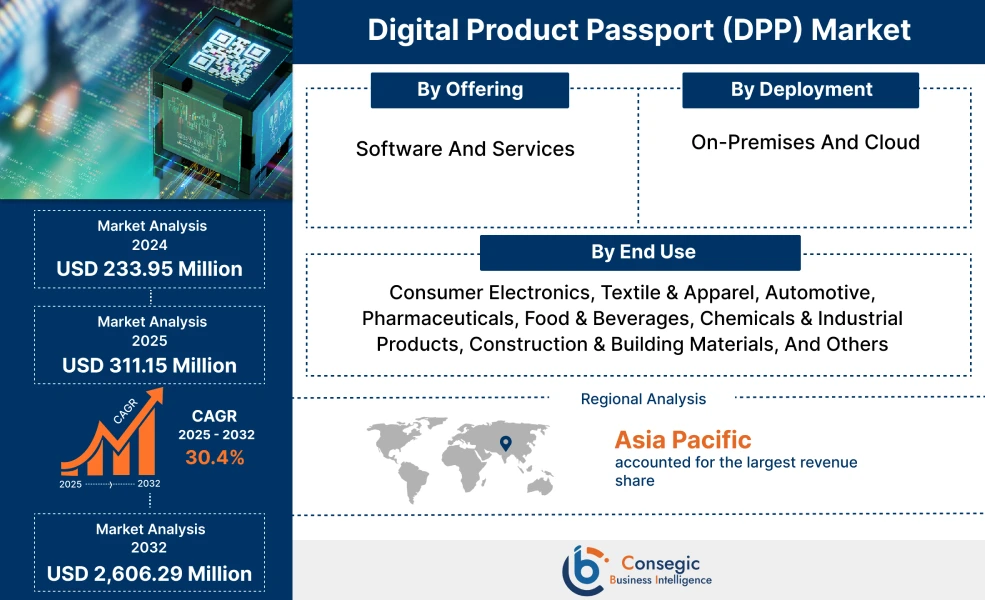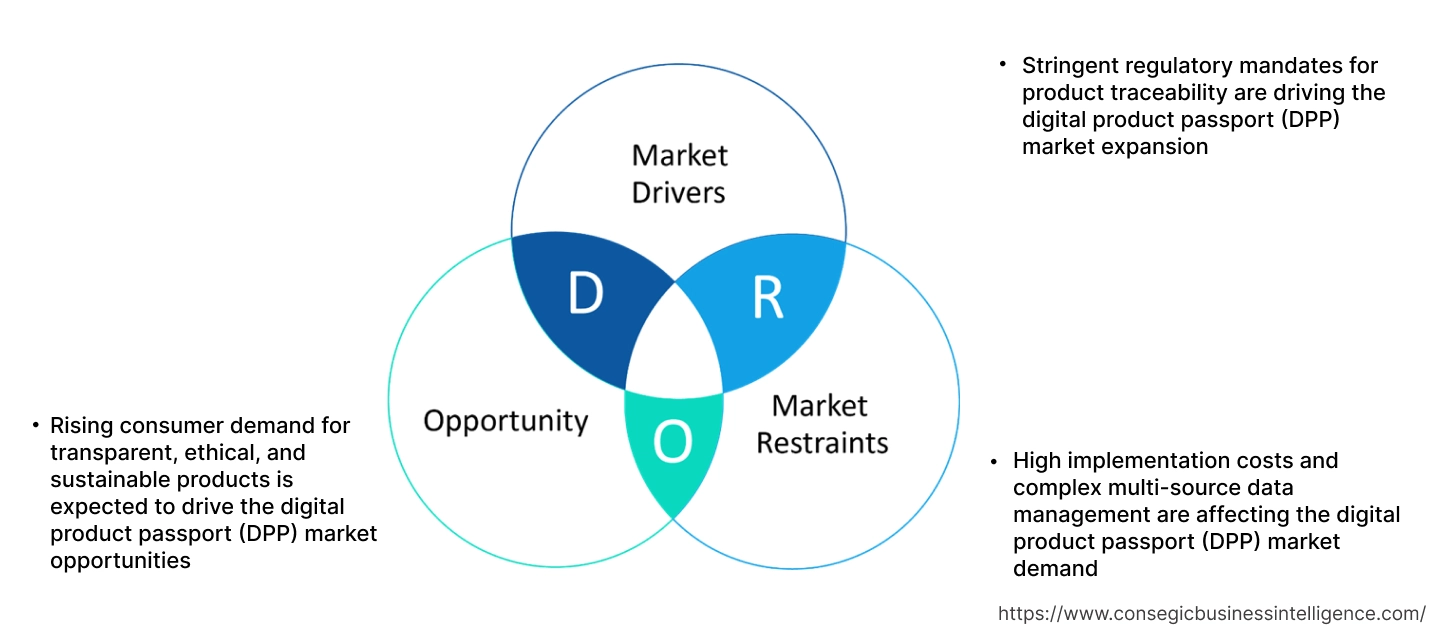Digital Product Passport (DPP) Market Size:
Digital Product Passport (DPP) Market Size is estimated to reach over USD 2,606.29 Million by 2032 from a value of USD 233.95 Million in 2024 and is projected to grow by USD 311.15 Million in 2025, growing at a CAGR of 30.4% from 2025 to 2032.
Digital Product Passport (DPP) Market Scope & Overview:
A digital product passport (DPP) is a digital record that provides comprehensive information about a product's lifecycle, particularly focusing on sustainability and circularity. It stores a wide range of product-related information, including material origins, manufacturing processes, durability, repair information, and sustainability metrics. The DPP aims to empower consumers and businesses to make more informed decisions, promote responsible production, and support a circular economy.
How is AI Impacting the Digital Product Passport Market?
AI is fundamentally reshaping the Digital Product Passport (DPP) market by automating the collection and analysis of vast, unstructured supply chain data. Generative AI is now being used to streamline the creation of DPPs by summarizing raw product information into clear, compliant metrics for sustainability and environmental impact. This significantly reduces the time and cost for businesses, especially smaller ones, to adhere to new regulations like the European Union's Ecodesign for Sustainable Products Regulation. By enabling automated data verification and enhanced traceability, AI is making DPPs more reliable and accessible, accelerating their adoption and paving the way for a more transparent and circular economy.
Digital Product Passport (DPP) Market Dynamics - (DRO) :
Key Drivers:
Stringent regulatory mandates for product traceability are driving the digital product passport (DPP) market expansion
The primary driver for the digital product passport market is the increasing implementation of regulatory frameworks aimed at enhancing product traceability and circular economy practices. The European Union’s Circular Economy Action Plan and upcoming Eco-design for Sustainable Products Regulation (ESPR) mandate the use of DPPs for industries like textiles, electronics, and batteries. These mandates push businesses to adopt transparent, data-driven systems for recording a product’s lifecycle details. Beyond compliance, companies also leverage DPPs to strengthen brand reputation, meet sustainability targets, and improve operational efficiency. This regulatory push is expected to accelerate adoption rates across developed markets and progressively influence global trade standards.
- For instance, in January 2025, Madaster introduced a new Digital Product Passport (DPP) platform tailored for the construction and manufacturing industries. This system is designed to gather and manage comprehensive data on a product's material composition, embodied carbon, potential for reuse, and end-of-life disposal. The platform's primary goal is to help companies comply with upcoming European Union circular economy regulations. By providing detailed product information, Madaster's DPP service empowers stakeholders to reduce waste and optimize resource efficiency. This initiative underscores a significant shift towards using data to drive sustainability in both the built environment and manufacturing sectors.
Thus, according to the digital product passport (DPP) market analysis, the stringent regulatory mandates for product traceability are driving the digital product passport (DPP) market size and growth.
Key Restraints:
High implementation costs and complex multi-source data management are affecting the digital product passport (DPP) market demand
Small and medium-sized enterprises (SMEs) particularly struggle with investing in blockchain-based platforms, RFID systems, and IoT integrations required for comprehensive DPP infrastructure. Additionally, standardizing data formats and ensuring compatibility across supply chain stakeholders remain difficult, especially in industries with fragmented supplier ecosystems. These operational and financial barriers slow down mass-market adoption, creating a divide between large corporations with digital infrastructure capabilities and smaller players with limited resources for compliance initiatives. Thus, the aforementioned factors would further impact the digital product passport (DPP) market size.
Future Opportunities :
Rising consumer demand for transparent, ethical, and sustainable products is expected to drive the digital product passport (DPP) market opportunities
Modern consumers increasingly value ethical production, product provenance, and environmental responsibility. Digital product passports enable brands to meet these expectations by providing accessible, verified information on a product’s origin, material composition, environmental impact, and repair or recycling options. Retailers and manufacturers adopting DPPs can leverage this transparency as a competitive differentiator, building trust and customer loyalty. As awareness grows, consumer-driven need is expected to drive adoption in sectors like fashion, electronics, and food packaging.
- For instance, in April 2024, IBM announced the launch of IBM Blockchain for Supply Chain, a platform designed to enhance product traceability and transparency across global supply chains. This solution leverages IBM's Hyperledger Fabric to provide immutable records of product journeys, supporting industries such as pharmaceuticals and electronics in meeting regulatory compliance and sustainability goals.
Thus, based on the above digital product passport (DPP) market analysis, the rising consumer demand for transparent, ethical, and sustainable products is expected to drive the digital product passport (DPP) market opportunities and growth.
Digital Product Passport (DPP) Market Segmental Analysis :
By Offering:
Based on offering, the market is segmented into software and services.
Trends in the offering:
- Service providers are offering end-to-end DPP solutions, including consultancy, hardware, software, and digital ID technology, to help brands navigate the complexities of implementation.
- DPP data is increasingly being integrated with broader ESG reporting frameworks, allowing companies to demonstrate their sustainability performance more comprehensively.
- Thus, based on the above analysis, these factors are driving the digital product passport (DPP) market demand and growth.
The software segment accounted for the largest revenue share in the year 2024.
- Industries like electronics, automotive, and textiles rely heavily on advanced software to capture, store, and verify product data throughout the value chain.
- The growing need for regulatory compliance, real-time data visualization, and seamless integration with existing ERP and SCM systems further drives this segment. It is projected to maintain its lead, supported by innovations in AI-driven analytics and decentralized data architectures in the upcoming years.
- The growing importance of digital transparency, sustainability, and circular economy practices is expected to significantly boost the use of DPP software across sectors like electronics, textiles, and construction materials.
- For instance, in July 2024, Eviden, in collaboration with the IOTA Foundation, has introduced the Eviden Digital Passport Solution (EDPS). This ready-to-use digital product passport utilizes blockchain technology, specifically IOTA's distributed ledger, to ensure secure and tamper-proof storage for data related to a product's lifecycle, carbon footprint, and sustainability performance. Initially, EDPS will focus on automotive batteries to help meet upcoming EU regulations, with broader applications for any industry needing traceability and ESG (Environmental, Social, and Governance) compliance.
- Thus, based on the above analysis, these developments are further driving the digital product passport (DPP) market growth and trends.
The services segment is anticipated to register the fastest CAGR during the forecast period.
- As businesses transition from legacy systems to DPP-enabled digital ecosystems, demand for expert guidance on regulatory compliance, data standardization, and multi-platform interoperability is growing.
- Managed services for system monitoring, upgrades, and data security are gaining traction as enterprises seek operational efficiency and risk mitigation.
- Businesses in sectors like fashion, consumer electronics, automotive, and industrial manufacturing are increasingly looking for specialized help to create digital product passport strategies to understand technical requirements and run pilot programs.
- Thus, the above factors are expected to drive the digital product passport (DPP) market share during the forecast period.
By Deployment:
Based on the deployment, the digital product passport (DPP) market is segmented into on-premises and cloud.
Trends in the deployment:
- By providing detailed information on material composition, recyclability, and repair instructions, DPPs facilitate the reuse, repair, and recycling of products, leading to reduced waste, optimized resource utilization, and lower operational costs.
- Brands can leverage DPPs as a direct digital channel to provide personalized care instructions, offer upgrades, and foster ongoing relationships with customers, extending the product's value beyond the initial sale.
- Thus, the above factors are driving the digital product passport (DPP) market trends and growth during the forecast period.
The on-premises accounted for the largest revenue share in the year 2024.
- In 2024, the on-premises deployment model held a significant market share in the global market. This was primarily driven by its adoption among large corporations and heavily regulated sectors like automotive, aerospace, and industrial manufacturing.
- These organizations prioritize data sovereignty, robust security, and direct control over their sensitive product and supply chain information.
- On-premises solutions offer the necessary flexibility for customized configurations and seamless integration with their existing legacy systems.
- Furthermore, many early adopters of DPPs initially developed proprietary in-house solutions to meet their specific operational needs, reinforcing their reliance on on-premises infrastructure during the early stages of implementation.
- Thus, based on the above analysis, these factors would further supplement the digital product passport (DPP) market share and trends.
The cloud segment is anticipated to register the fastest CAGR during the forecast period.
- Cloud deployment models are becoming increasingly attractive to both small and medium-sized enterprises (SMEs) and large multinational corporations that need to implement digital product passport (DPP) solutions across their globally distributed operations.
- Cloud infrastructure allows immediate data capture and synchronization, ensuring that DPPs always contain the most current information throughout a product's lifecycle.
- Cloud platforms facilitate secure and controlled sharing of DPP data with various stakeholders across the value chain, from suppliers to recyclers.
- Thus, these factors would further supplement the digital product passport (DPP) market during the forecast period.
By End Use:
Based on end use, the market is segmented into consumer electronics, textile & apparel, automotive, pharmaceuticals, food & beverages, chemicals & industrial products, construction & building materials, and others.
Trends in the end use:
- The increasingly stringent EPR schemes worldwide shift the burden of end-of-life management to producers, making DPPs necessary for tracking and optimizing recovery processes in several industry verticals.
- DPPs facilitate sustainable product design, material sourcing, and end-of-life recycling by providing full lifecycle visibility. With growing consumer demand for ethical and sustainable products, companies in industries like fashion, electronics, and automotive are adopting DPP solutions to meet environmental targets and improve their ESG performance.
- These factors are anticipated to further drive the digital product passport (DPP) market trends during the forecast period.
The textile & apparel segment accounted for the largest revenue share of 30.56% in the year 2024 and it is expected to register the highest CAGR during the forecast period.
- The segment growth is driven by the increasing consumer awareness regarding transparency in sourcing, production methods, and environmental impact.
- New era of transparency fashion brands are leveraging DPPs to inform consumers about materials, manufacturing processes, and sustainability practices.
- Regulatory pressures, including in the EU and California, are also spurring the industry to track and disclose product lifecycle data.
- Thus, based on the above analysis, these factors are driving the digital product passport (DPP) market growth and trends.
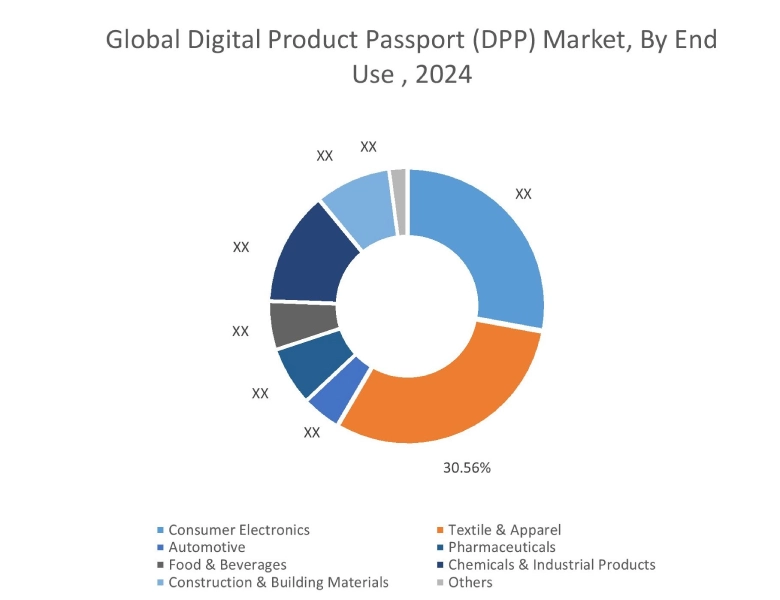
Regional Analysis:
The global market has been classified by region into North America, Europe, Asia-Pacific, Middle East & Africa, and Latin America.
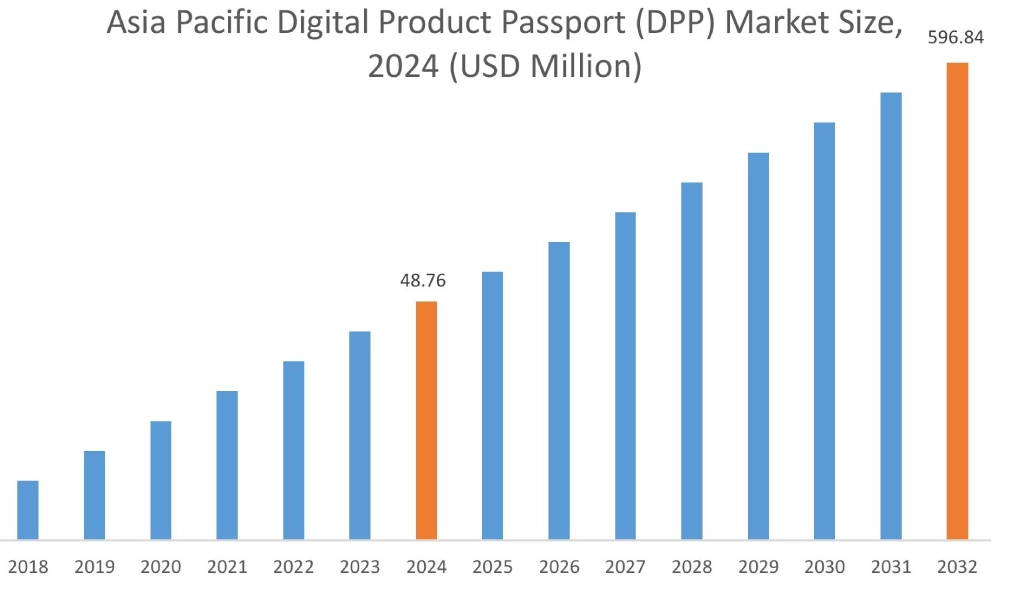
Asia Pacific digital product passport (DPP) market expansion is estimated to reach over USD 596.84 million by 2032 from a value of USD 48.76 million in 2024 and is projected to grow by USD 65.38 million in 2025. Out of this, the China market accounted for the maximum revenue split of 34.70%. The region is home to a significant portion of global manufacturing across diverse sectors like electronics, textiles, automotive, and industrial machinery among others. This extensive production network necessitates robust traceability and information management systems. Further, the region's supply chains are often multi-tiered and geographically dispersed. DPPs offer a crucial tool to bring transparency and traceability to these complex networks, from raw material sourcing to finished product delivery. These trends would further drive the regional digital product passport (DPP) market during the forecast period.
- For instance, in April 2025, the United Nations Economic Commission for Europe (UNECE) and the International Organization for Standardization (ISO) have teamed up to create a joint initiative focused on the digital product passport (DPP). This UN-led effort seeks to harmonize various interests and priorities, promoting consistent approaches to DPPs across different industries and global regions, including North America, Europe, and Asia Pacific, all with the goal of advancing sustainability and the circular economy.
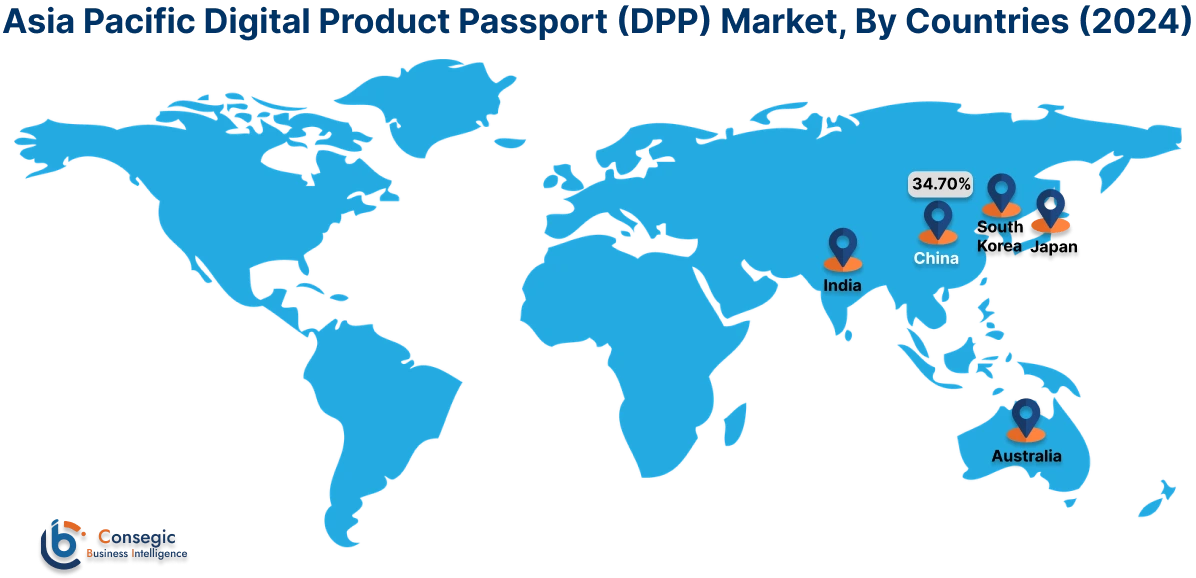
Europe market is expected to reach over USD 938.26 million by 2032 from a value of USD 84.67 million in 2024 and is projected to grow by USD 112.57 million in 2025. European consumers are highly conscious of environmental issues and increasingly willing to make purchasing decisions based on a product's sustainability credentials. Surveys indicate a significant percentage of Europeans consider environmental impact important when buying. Further, companies are proactively adopting DPPs and providing verifiable sustainability information can significantly enhance their brand reputation, foster consumer trust, and differentiate themselves in a competitive market. This also helps in addressing consumer doubts about green claims. These trends would further drive the market in Europe.
According to the analysis, the digital product passport (DPP) industry in North America is anticipated to witness significant development during the forecast period. The regional market is driven by strong regulatory frameworks, high consumer demand for sustainable and transparent products, and the presence of major corporations adopting advanced technologies. The U.S. is leading the charge with initiatives aimed at improving product traceability, enhancing sustainability, and meeting regulatory compliance. Additionally, companies in the Latin American region are increasingly implementing digital product passport (DPP) systems to monitor and disclose comprehensive product data, such as material origins, environmental effects, and disposal methods. Further, brands in the Middle East & Africa region are increasingly using digital product passports (DPPs) to offer consumers comprehensive product details, including information on where materials come from, how products are made, and their environmental footprint. This transparency not only fosters consumer trust but also enables valuable services like verifying product authenticity, facilitating resales, supporting repairs, and streamlining recycling processes.
Top Key Players and Market Share Insights:
The global digital product passport (DPP) market is highly competitive with major players providing solutions and services to the national and international markets. Key players are adopting several strategies in research and development (R&D), product innovation, and end-user launches to hold a strong position in the market. Key players in the digital product passport (DPP) industry include-
- 3E (U.S.)
- Avery Dennison (U.S.)
- LyondellBasell Industries Holdings B.V. (U.K.)
- OPTEL GROUP (Canada)
- Sigma Technology (Sweden)
- Billon Group (U.K.)
- Circularise (Netherlands)
- CIRPASS (France)
- Det Norske Veritas Group (DNV) (Norway)
- iPoint-systems GmbH (Germany)
- Kezzler (Norway)
Digital Product Passport (DPP) Market Report Insights :
| Report Attributes | Report Details |
| Study Timeline | 2019-2032 |
| Market Size in 2032 | USD 2,606.29 Million |
| CAGR (2025-2032) | 30.4% |
| By Offering |
|
| By Deployment |
|
| By End Use |
|
| By Region |
|
| Key Players |
|
| North America | U.S. Canada Mexico |
| Europe | U.K. Germany France Spain Italy Russia Benelux Rest of Europe |
| APAC | China South Korea Japan India Australia ASEAN Rest of Asia-Pacific |
| Middle East and Africa | GCC Turkey South Africa Rest of MEA |
| LATAM | Brazil Argentina Chile Rest of LATAM |
| Report Coverage |
|
Key Questions Answered in the Report
How big is the Digital Product Passport (DPP) Market? +
Digital Product Passport (DPP) market size is estimated to reach over USD 2,606.29 Million by 2032 from a value of USD 233.95 Million in 2024 and is projected to grow by USD 311.15 Million in 2025, growing at a CAGR of 30.4% from 2025 to 2032.
Which is the fastest-growing region in the Digital Product Passport (DPP) Market? +
Asia-Pacific region is experiencing the most rapid growth in the market.
What specific segmentation details are covered in the Digital Product Passport (DPP) report? +
The digital product passport (DPP) report includes specific segmentation details for offering, deployment, end use, and region.
Who are the major players in the Digital Product Passport (DPP) Market? +
The key participants in the market are 3E (U.S.), Avery Dennison (U.S.), Billon Group (U.K.), Circularise (Netherlands), CIRPASS (France), Det Norske Veritas Group (DNV) (Norway), iPoint-systems GmbH (Germany), Kezzler (Norway), LyondellBasell Industries Holdings B.V. (U.K.), OPTEL GROUP (Canada), Sigma Technology (Sweden), and others.
